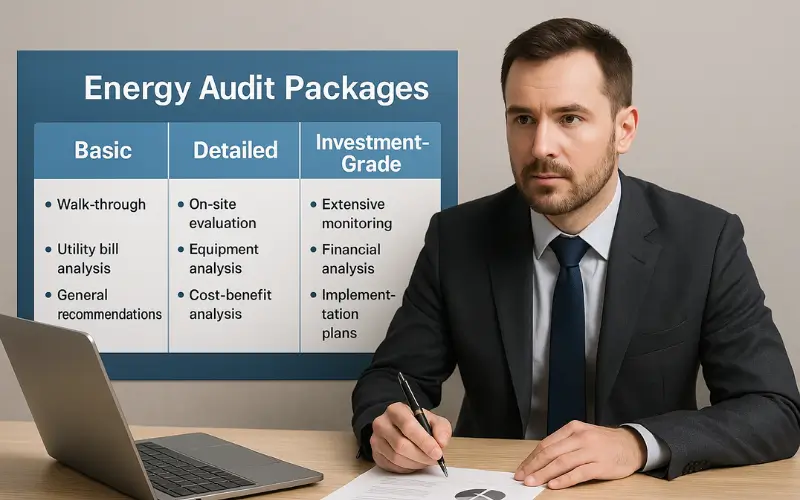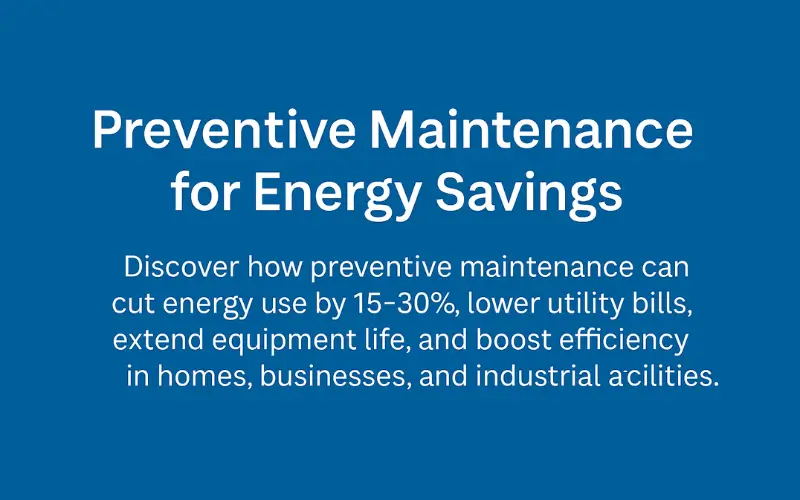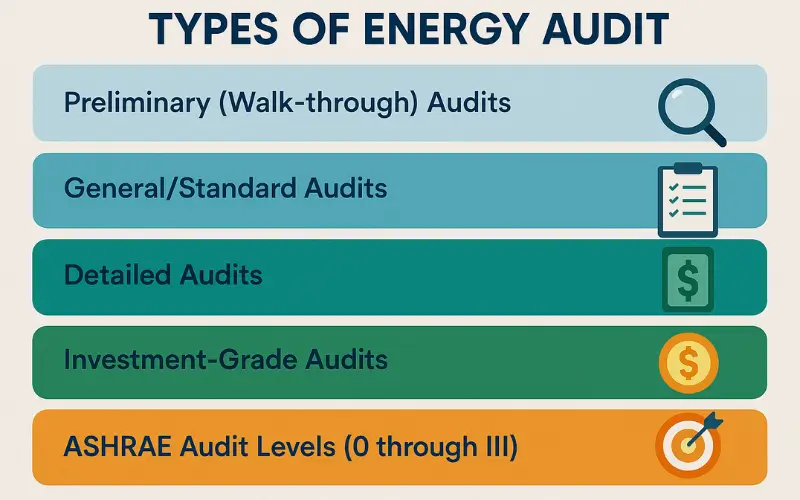An energy audit package is a comprehensive service designed to analyze how energy is used within a building or facility and identify opportunities to improve efficiency and reduce costs. Whether you’re a homeowner, business owner, or facility manager, selecting the right energy audit package can make a significant difference in your energy savings and sustainability goals.
Choosing the best energy audit package is essential because not all audits offer the same depth, tools, or recommendations. Some focus on quick, basic checks, while others dive deep into data and provide detailed investment-grade analyses.
In this article, we will explore the different types of energy audit packages available, compare their features, costs, and benefits, and provide practical guidance to help you decide which package fits your specific needs. By the end, you’ll be equipped with all the information necessary to make an informed decision and maximize the value of your energy audit.
Understanding Energy Audits
What is an energy audit?
An energy audit is a systematic process of inspecting and analyzing a building or facility’s energy consumption to identify areas where energy is being wasted and opportunities for improvement. It involves collecting data on energy use patterns, evaluating equipment efficiency, and assessing operational practices.
Purpose and benefits of conducting an energy audit
- Reduce energy costs: Identify inefficiencies to cut down on unnecessary energy expenses.
- Improve operational efficiency: Optimize equipment and processes for better performance.
- Enhance comfort and safety: Improve lighting, heating, ventilation, and air conditioning systems.
- Support sustainability goals: Reduce carbon footprint and environmental impact.
- Comply with regulations: Meet local or industry energy standards.
Key components of an energy audit package
Energy usage analysis: Reviewing utility bills, monitoring consumption patterns, and benchmarking against similar facilities.
- Site inspection: On-site evaluation of equipment, systems, and building envelope to detect inefficiencies and potential issues.
- Reporting and recommendations: Detailed documentation of findings, prioritized energy-saving measures, cost estimates, and potential ROI.
Types of Energy Audit Packages
Basic/Preliminary Energy Audit Packages
These are high-level audits designed to provide a quick overview of energy consumption and identify obvious inefficiencies. They typically include:
- Utility bill analysis
- Walk-through site inspection
- General recommendations for improvement
Suitable for: small businesses or homeowners seeking a low-cost, quick energy check.
Detailed Energy Audit Packages
A more in-depth audit involving comprehensive data collection and analysis. Features include:
- Detailed on-site measurements
- Equipment-level energy use analysis
- Identification of specific energy-saving opportunities
- Cost-benefit analysis of recommended measures
Suitable for: Medium to large commercial buildings or facilities planning significant energy improvements.
Investment-Grade Energy Audit Packages
The most comprehensive type, designed to support major capital investments in energy efficiency projects. Includes:
- Extensive data monitoring (sub-metering, sensors)
- Detailed financial analysis and project feasibility
- Engineering evaluations and risk assessments
- Customized implementation plans
Suitable for: Large industrial facilities and organizations requiring precise ROI forecasts and project financing support.
Specialized Energy Audit Packages (e.g., Industrial, Commercial, Residential)
Energy audit packages tailored to specific sectors or building types, addressing unique systems and requirements:
- Industrial audits: Focus on heavy machinery, process efficiency, and energy-intensive operations.
- Commercial audits: Emphasize HVAC systems, lighting, and building management.
- Residential audits: Focus on insulation, appliances, and behavior-based savings.
Each specialized package adapts tools and techniques to the unique challenges of the sector.
Key Factors to Compare When Choosing an Energy Audit Package
Scope of audit
Understand how extensive the audit is — does it cover all areas of your facility, or just select systems? A broader scope usually means better insights but higher cost.
Methodology and tools used
Check whether the auditor uses advanced tools like thermal imaging, data loggers, or sub-metering to gather precise data versus basic visual inspections.
Depth of data analysis
Some packages provide simple recommendations based on high-level data, while others include detailed modeling and simulation to predict energy savings accurately.
Reporting quality and recommendations
Look for clear, actionable reports with prioritized measures, cost estimates, and expected payback periods, rather than generic advice.
Cost and pricing models
Compare package costs against the value provided. Some auditors charge flat fees, others by the scope or hours worked.
Provider’s expertise and certifications
Ensure the auditor is certified (e.g., Certified Energy Manager – CEM) and has experience in your industry sector.
Turnaround time
Consider how quickly you need the audit completed and the report delivered.
Post-audit support and implementation assistance
Some packages include help with applying recommendations, project management, or monitoring savings after implementation.
Common Features Included in Most Energy Audit Packages
Energy consumption benchmarking
Most packages start by comparing your energy use against similar facilities or industry standards to identify inefficiencies.
Identification of energy-saving opportunities
Auditors pinpoint areas where you can reduce consumption, such as upgrading lighting, improving insulation, or optimizing HVAC operations.
Cost-saving potential and ROI estimation
A good energy audit package provides estimates on how much you could save and how soon your investment will pay off.
Environmental impact assessment
Some audits include calculating your carbon footprint and suggest ways to reduce greenhouse gas emissions.
Customized energy management strategies
Based on your facility’s unique needs, auditors offer tailored recommendations for energy policies, operational changes, or technology upgrades.
How to Evaluate the Effectiveness of an Energy Audit Package
Accuracy of findings
The audit should be based on reliable data and thorough analysis to ensure the results truly reflect your energy use.
Practicality of recommendations
Look for solutions that fit your facility’s operations and budget — overly complex or expensive suggestions may be unrealistic.
Measurable energy savings post-implementation
A valuable energy audit package helps you track the impact of implemented measures with clear metrics.
Client testimonials and case studies
Check reviews and success stories from other clients to gauge the auditor’s track record and reliability.
Case Studies: Comparing Popular Energy Audit Packages
Overview of leading energy audit service providers
Highlight top providers known for quality audit packages—examples might include companies like Schneider Electric, Johnson Controls, or local certified energy auditors.
Package comparison table (features, price, scope)
| Provider | Package Type | Key Features | Price Range | Ideal For |
| Schneider Electric | Investment-Grade | Sub-metering, ROI analysis, support | $$$ | Large industrial clients |
| Johnson Controls | Detailed Energy Audit | Site inspection, benchmarking | $$ | Commercial buildings |
| Local Certified Auditors | Basic/Preliminary | Utility bill analysis, walk-through | $ | Small businesses |
(Note: Actual prices and features will vary; customize per your research.)
Real-world examples of outcomes
Example 1: Industrial facility reduced energy costs by 20% after investment-grade audit implementation.
Example 2: Small office achieved quick payback within 6 months through basic audit recommendations.
DIY vs. Professional Energy Audit Packages
Pros and cons of DIY energy audit tools/packages
Pros:
- Low cost or free options
- Immediate access and control
- Useful for simple, basic assessments
Cons:
- Limited accuracy and scope
- Lack of specialized tools and expertise
- May miss complex inefficiencies
When to opt for professional audit services
- Large or complex facilities with significant energy use
- Need for detailed financial analysis and investment planning
- Compliance with regulatory requirements or certification programs
- Desire for tailored recommendations and ongoing support
Tips for Selecting the Best Energy Audit Package for Your Needs
Assess your facility and energy goals
Understand your current energy usage, goals for savings, and areas of concern to choose a package that matches your priorities.
Define your budget and timeline
Be clear about how much you can invest upfront and when you need the audit results to plan accordingly.
Look for certifications and expertise
Choose auditors with recognized credentials (like CEM or LEED) and experience relevant to your industry.
Ask for references and past results
Request case studies or testimonials to verify the auditor’s capability and effectiveness.
Ensure clarity on deliverables and follow-up
Confirm what you will receive in the audit report, the format, and if post-audit support or implementation help is offered.
Conclusion
Choosing the right energy audit package is a crucial step toward improving energy efficiency, reducing costs, and achieving sustainability goals. Whether you opt for a basic preliminary audit or a comprehensive investment-grade package, understanding the differences, key features, and what to expect will help you make an informed decision.
Evaluate packages based on scope, methodology, cost, and provider expertise to find one that aligns with your facility’s needs and budget. Remember, the best energy audit package is one that delivers accurate insights, practical recommendations, and measurable results.
Taking the time to compare options and ask the right questions ensures you get the most value from your energy audit, setting the stage for long-term savings and environmental benefits.
Frequently Asked Questions (FAQs)
1. What is included in a typical energy audit package?
A typical package includes energy usage analysis, site inspection, identification of energy-saving opportunities, and a detailed report with recommendations.
2. How much does an energy audit package cost?
Costs vary widely depending on the audit type, scope, and provider, ranging from a few hundred dollars for basic audits to several thousand for investment-grade audits.
3. How long does an energy audit take?
A basic audit can take a few hours to a day, while detailed or investment-grade audits may take several days to weeks, depending on facility size and complexity.
4. Can an energy audit package guarantee energy savings?
While audits provide recommendations with estimated savings, actual results depend on implementation and operational changes.
5. Are energy audit packages suitable for small businesses?
Yes, there are audit packages tailored to small businesses, often focusing on quick wins and cost-effective measures.
6. What certifications should I look for in an energy auditor?
Look for credentials such as Certified Energy Manager (CEM), LEED Accredited Professional, or certification from recognized energy audit bodies.




